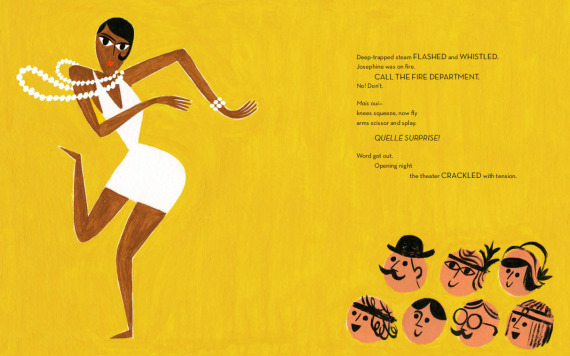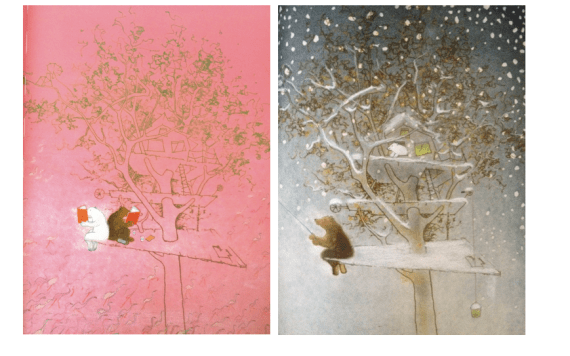Not only do these two share some similarities in look—subdued colors, line drawings, strangely-shaped figures—but they also share two young men as main characters. They also share theme. In different ways, they’re both about peace. Individuals not entities. Food not weapons. Come see…
The Enemy by Davide Cali and Serge Bloch (2007).
Not an easy book. After all, the setting is a hole, well two holes, in the middle of a desert in the middle of a war. We follow one of the soldiers in one of the holes.
The two soldiers are hiding from each other. Sometimes shooting at each other. They both light fires to cook. They both get hungry. They both are alone. They both have families back home. They both suffer.
They’ve both been told the other is the enemy. But if the the other guy thinks he’s the enemy, how can the other guy be the enemy too? It’s a conundrum of war seen up close in this story. (That, if it’s not already clear, is not for very young children.)
As our soldier begins to think about the other soldier and even ventures over to his hole, he realizes they are the same. They read the same manuals about the enemy, the only difference is which side the manual targets.
“Maybe he has a family?
I wasn’t expecting this.
They didn’t tell us anything about this.”
At the end, we know the two soldiers have been on the same journey. And we know they’ll stop fighting one another because now, even though they don’t actually know each other, they really do.

The Tomato Patch by William Wondriska (that’s Wondriska of A Long Piece of String design fame) (1964).
This one is less overtly about war, but about fighting tools and what they create. It tells of two kingdoms separated only by a forest. Both kingdoms are full of weapons. They eat food out of cans and they make weapons. That’s it.
Spears and arrows until there isn’t any room for any more. But still, more weapons anyway. Bows, daggers, slingshots.
Then the prince from each kingdom wanders into the forbidden forest. They meet and, together, find a tomato patch. It’s a strange, wondrous, unbelievable thing, especially since their food comes from cans. They laugh, for the first time.
(Aren’t you grateful for that pop of orange-red after all the bleakness?! I am.)
And of course, the girl who tends the tomatoes sends each prince home with a tomato plant. And everything changes. The kingdoms go from weapons to tomatoes. From tomatoes to corn. And instead of wearing armor, they wear the clothes of farmers and weavers. There are no more weapons. They grow food and play games. Sounds great, right?
Two books about war and weapons, but ultimately about empathy and change and hope. About peace.





































































































